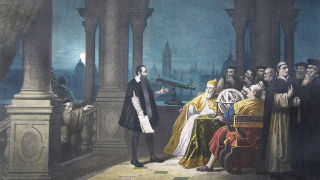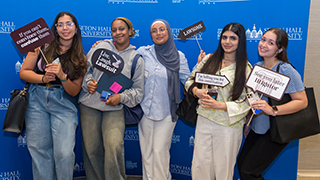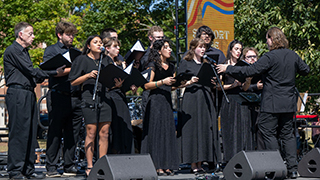Core II Students Study Faith and Science - Seton Hall University
Friday, February 21, 2020

We discussed how the inclusion of the ideas of Aristotle, a good thing – and something that showed some open-mindedness in the Christian, as well as the Jewish and Muslim, thinkers who brought his philosophy into their understanding of faith – had become rigid, something to be defended against challenge. There is an irony that what began in an attitude of openness led to an attitude of being closed. However, that is human nature, and the church, being a divine institution made up, however, of imperfect human beings reflects that human nature in this regard. Saint John Paul II made an official statement, an apology as it were, about Galileo. The church, in fact, has its own observatory at the Vatican.
But there is more complexity to the issue than that. Even medieval educated people knew that the earth was round, not flat, as we see in the text we read in the Core by St. Thomas Aquinas and that the sun was much larger than the earth, as we see in the Core text by Islamic scholar Ibn Rushd. The developing scientific knowledge did not rush onto the world scene with the work of Galileo. His telescopic discoveries proved a theory put forward about a century earlier by Nicolaus Copernicus, a Polish scientist – and Catholic priest. He certainly did not advance his ideas to undermine Scripture, but no doubt saw his theorizing as a legitimate use of the sacred reason given to us by God. Galileo, also a deeply religious person, believed that "the holy Bible can never speak untruth – whenever its true meaning is understood," but he goes on to explain that "in expounding the bible if one were always to confine oneself to the unadorned grammatical meaning, one might fall into error...." In other words, sometimes a super-literalistic interpretation of the Bible can cause us to miss the truth in the message intended. Ibn Rushd makes a similar point regarding the Quran. There are times when it is right to understand Scripture allegorically. A very obvious example would be when Jesus says, "I am the Door." He is not literally talking about a door but his role in opening up salvation to believers. There are countless other examples like this, and Galileo would argue that faith necessitates using reason to discern, with the guidance of the Holy Spirit, which these are and how to understand them.
So, do faith and reason contradict one another? If we at Seton Hall believed that, we would not have such a thing as a Catholic University. Science, despite conflicts like that between the church and Galileo, grew out of a world of faith that believed in a rational universe that followed certain laws, which could be understood and explored. And faith and reason did not stop working together in modern times. Many great modern scientists have been very religious people, as was the case with Einstein, as well as George LeMaitre, the Belgian scientist and Catholic priest who developed the "Big Bang" theory. As Karin Oberg, astrophysicist of Harvard University, referenced in a talk last fall – her faith developed after her career as a scientist, and the two blend together in a complex and beautiful way.
Categories: Faith and Service






